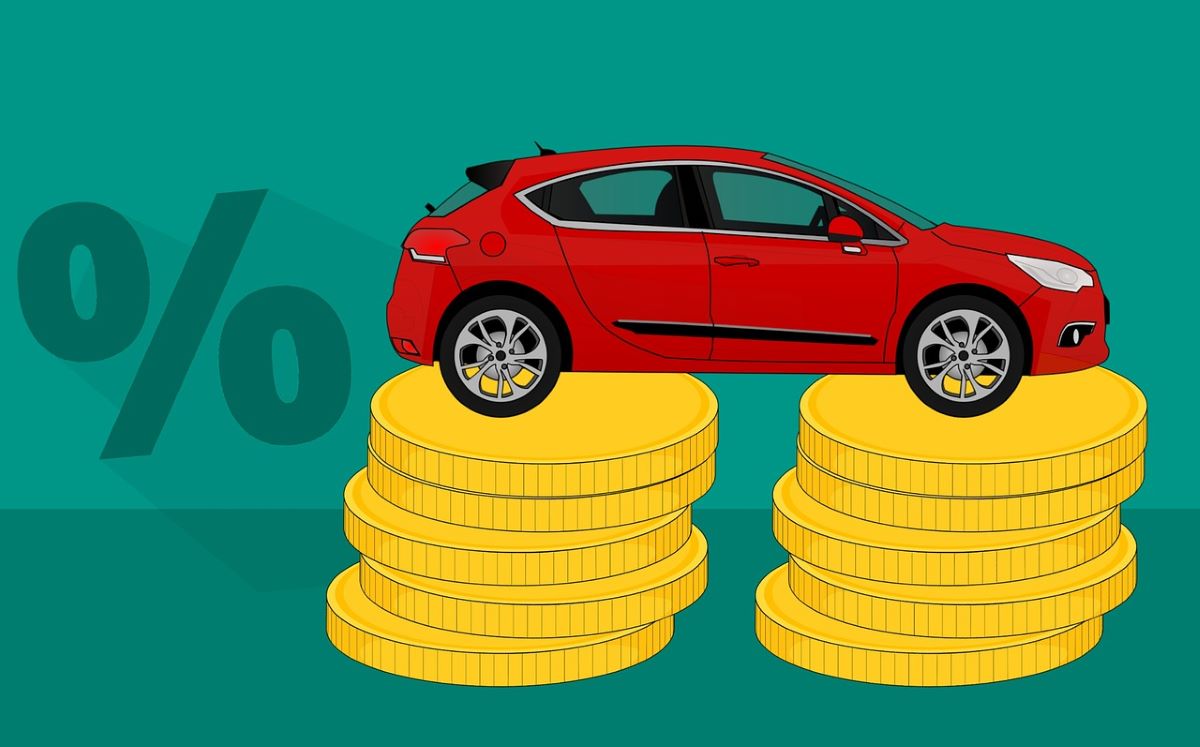

Finance
How To Get A Car Using Business Credit
Modified: February 21, 2024
Looking to finance a new car? Discover how to leverage your business credit to secure financing for your dream car and make it a reality.
(Many of the links in this article redirect to a specific reviewed product. Your purchase of these products through affiliate links helps to generate commission for LiveWell, at no extra cost. Learn more)
Table of Contents
- Introduction
- Understanding Business Credit
- Benefits of Using Business Credit to Get a Car
- Steps to Obtain a Car Using Business Credit
- Establishing and Building Business Credit
- Researching Car Financing Options
- Submitting the Car Loan Application
- Negotiating the Terms of the Car Loan
- Finalizing the Car Purchase
- Conclusion
Introduction
Getting a car for your business can be a significant investment, but it doesn’t have to drain your personal finances. By utilizing business credit, you can secure a car loan and finance the vehicle solely through your business. This strategy not only helps you maintain a clear separation between your personal and business finances but also offers a range of benefits you may not get with personal financing.
Understanding how to effectively use business credit to get a car is crucial for business owners looking to expand their fleet or simply upgrade their vehicles. In this article, we will delve into the specifics of using business credit to get a car, including the steps involved and the benefits you can expect.
Firstly, let’s clarify what exactly business credit is. Business credit is a way for companies to establish credit separate from the personal credit of the business owner. It allows businesses to access funding, loans, and credit lines based on the creditworthiness of the company itself. Similar to personal credit, business credit is determined by various factors such as payment history, credit utilization, and length of credit history.
Now, let’s explore the advantages of using business credit for car financing.
When you utilize business credit to finance a car, you enjoy several benefits. Firstly, it helps establish and build your business credit profile. By making regular payments on time, you demonstrate your business’s ability to manage credit responsibly, which can open doors to future financing opportunities.
In addition, using business credit allows you to preserve your personal credit. Car purchases can be significant financial commitments, and relying solely on personal credit for such purchases can affect your personal credit score and borrowing capacity. By separating your personal and business financing, you safeguard your personal creditworthiness.
Furthermore, using business credit for car financing can provide tax benefits. Depending on your jurisdiction, you may be able to deduct car-related expenses, such as lease payments or mileage, as a business expense. Consult with a tax professional to understand the specific deductions available to you and maximize your savings.
Now that you understand the advantages, let’s dive into the steps involved in obtaining a car using business credit.
Understanding Business Credit
Before you can effectively use business credit to get a car, it’s crucial to have a solid understanding of what business credit entails. Business credit is separate from personal credit and is specifically tied to your business’s financial history and credibility.
When assessing your business creditworthiness, lenders and financial institutions typically consider several factors, including:
- Payment History: Your track record of making timely payments to creditors and suppliers.
- Credit Utilization: The ratio of your outstanding credit balance to your available credit limit.
- Length of Credit History: The age of your business and the length of time you’ve been using credit.
- Public Records: Any legal and financial judgments against your business, such as bankruptcies or liens.
- Business Financials: Your business’s financial statements, including income statements, balance sheets, and cash flow statements.
Understanding and monitoring your business credit is vital for maintaining a healthy financial profile. To establish and build your business credit, consider the following steps:
- Separate Your Business and Personal Finances: Open a separate business bank account and obtain a federal employer identification number (EIN) to clearly distinguish your business from your personal finances.
- Register with Business Credit Bureaus: Just like personal credit bureaus, there are business credit bureaus that track and report on your business’s credit history. Register with these bureaus to ensure your business credit activity is being recorded.
- Establish Vendor Credit: Begin by establishing relationships with vendors who offer credit arrangements to businesses. Start small and make timely payments to build a positive credit history.
- Apply for Small Business Credit Cards: Utilize small business credit cards responsibly, making payments on time and keeping your credit utilization in check.
- Monitor Your Credit Report: Regularly review your business credit report and address any inaccuracies or discrepancies immediately.
By taking these steps, you can establish and build a solid business credit foundation, which will enable you to leverage business credit for various financial needs, including obtaining a car loan.
Now that you have a good understanding of business credit, let’s explore the benefits of using it to get a car.
Benefits of Using Business Credit to Get a Car
Using business credit to finance a car comes with a range of benefits that can make the process more advantageous for business owners. Let’s explore some of the key advantages:
- Separation of Personal and Business Finances: By utilizing business credit to get a car, you can keep your personal and business finances separate. This separation is crucial for maintaining financial transparency, legal liability protection, and accurate accounting records.
- Preservation of Personal Credit: Keeping your personal credit separate from business financing allows you to safeguard your personal credit history. This is important since personal credit scores are often used by lenders for personal loans, mortgages, and other personal financial transactions.
- Opportunity to Establish and Build Business Credit: Financing a car through business credit provides an excellent opportunity to establish and build your business credit profile. By making regular, on-time payments, you demonstrate your business’s creditworthiness, which can open doors to future financing options and better terms.
- Potential Tax Benefits: When you finance a car through your business, you may be eligible for certain tax deductions. Depending on your jurisdiction and the specific use of the car for business purposes, you may be able to deduct payments, maintenance expenses, and even depreciation on your taxes. Consult with a tax professional to maximize your tax benefits.
- Access to Business Financing Options: Building a strong business credit history through car financing can increase your eligibility for other types of business financing, such as lines of credit, business loans, or equipment financing. Your ability to manage car payments responsibly builds trust with lenders and improves your chances of securing future financing.
- Potential for Lower Interest Rates and Better Terms: By using business credit to finance a car, you may have access to more competitive interest rates and favorable terms compared to personal financing options. Business loans often come with lower interest rates due to the perceived lower risk associated with business transactions.
These benefits make using business credit an attractive option for acquiring a car for your business. However, it’s important to note that the availability of these benefits may vary depending on your specific circumstances and jurisdiction. It’s always advisable to consult with financial and tax professionals to understand the full extent of the advantages you can expect when using business credit to get a car.
Next, let’s dive into the steps involved in obtaining a car using business credit.
Steps to Obtain a Car Using Business Credit
When it comes to obtaining a car using business credit, there are a few important steps to follow. By following these steps, you can increase your chances of securing a car loan and financing the vehicle through your business. Let’s explore the process:
- Establish and Build Your Business Credit Profile: Before applying for a car loan, it’s important to have a solid business credit history. Make sure you have been using credit responsibly and have built a positive credit profile for your business. Lenders typically look for a good credit score and a history of timely payments.
- Research Car Financing Options: Explore different car financing options available to businesses. This may include traditional banks, credit unions, online lenders, or specialized business vehicle financing companies. Compare the interest rates, terms, and requirements of each option to find the best fit for your business.
- Prepare Your Financial Documents: Gather the necessary financial documentation to support your car loan application. This typically includes your business’s financial statements, tax returns, bank statements, and any other relevant financial records. Having these documents organized and readily available will streamline the application process.
- Submit the Car Loan Application: Fill out the car loan application with the lender of your choice. Provide all requested information accurately and completely. Include your business credit information and any other supporting documents as required by the lender. Be prepared to provide additional information or answer any questions from the lender during the application review process.
- Negotiate the Terms of the Car Loan: Once your application is reviewed and accepted, you will receive an offer from the lender. Take the time to carefully review the terms, such as the interest rate, repayment period, and any additional fees. Negotiate the terms if possible, aiming for the most favorable terms that align with your business’s financial goals and capabilities.
- Finalize the Car Purchase: Once you agree to the loan terms, finalize the car purchase. Provide the necessary documentation to complete the financing process. This may include the vehicle details, insurance information, and any other requirements outlined by the lender. Ensure that the car title is registered under the name of your business.
By following these steps, you can navigate the process of obtaining a car using your business credit successfully. Keep in mind that each lender may have specific requirements and processes, so it’s essential to adapt these steps based on the lender’s guidance. With careful planning and preparation, you can acquire a car for your business while leveraging your business credit effectively.
Now, let’s move on to the importance of establishing and building your business credit.
Establishing and Building Business Credit
Establishing and building business credit is essential for accessing financing options and securing loans for your business, including car financing. By proactively working to establish and build your business credit, you increase your eligibility for favorable loan terms and lower interest rates. Let’s explore some key steps to establish and build your business credit:
- Separate Personal and Business Finances: Open a separate business bank account and obtain a federal employer identification number (EIN) to clearly distinguish your business’s financial transactions from your personal finances. Keeping personal and business finances separate is crucial for building a strong business credit profile.
- Register with Business Credit Bureaus: Register your business with major business credit bureaus, such as Dun & Bradstreet, Experian, and Equifax. These bureaus track and report on your business credit activity, which helps establish your business’s creditworthiness.
- Establish Trade Lines: Begin building your business credit by establishing relationships with vendors and suppliers who offer trade credit. Start with smaller vendors who are more likely to extend credit to newer businesses. Make timely payments to these vendors, as they can report your payment history to the credit bureaus.
- Apply for a Business Credit Card: Applying for a business credit card can help establish credit for your business. Use the credit card responsibly, making regular, on-time payments, and keeping your credit utilization low. This demonstrates your ability to manage credit effectively.
- Get a Business Loan or Line of Credit: Taking out a business loan or opening a line of credit can also contribute to building your business credit. Again, it’s crucial to make timely payments to establish a positive payment history.
- Monitor Your Business Credit Report: Regularly monitoring your business credit report allows you to stay updated on your credit score and assess any errors or discrepancies. Address any inaccuracies promptly to ensure the accuracy of your credit profile.
- Build a Positive Payment History: One of the most critical factors in building business credit is maintaining a positive payment history. Make all payments to your creditors and vendors on time and in full, as missed or late payments can have a negative impact on your creditworthiness.
- Establish Longevity: The length of time your business has been utilizing credit is an essential factor in building credit. Therefore, starting to establish credit as early as possible is beneficial for your business’s creditworthiness.
By following these steps, you can establish and build a strong business credit history. This lays the foundation for accessing various financing options, including car loans, with better terms and lower interest rates. Building business credit requires patience and consistent financial responsibility, but the long-term benefits are worth it.
Now that you understand the importance of building business credit, let’s move on to researching car financing options.
Researching Car Financing Options
When it comes to financing a car for your business, conducting thorough research on the available options is crucial. Taking the time to explore different car financing options allows you to find the best fit for your business’s needs and financial goals. Here are some key points to consider when researching car financing options:
- Traditional Banks and Credit Unions: Start your research by reviewing the car financing options offered by traditional banks and credit unions. These institutions often provide business loans and lines of credit for purchasing vehicles. They may have established relationships with local car dealerships and offer competitive interest rates.
- Online Lenders: Online lenders have become increasingly popular, offering convenient and accessible financing options. Research reputable online lenders that specialize in business financing. Compare their interest rates, loan terms, and customer reviews to gauge their reliability and suitability for your business.
- Automotive Dealerships: Car dealerships often have in-house financing options or partnerships with financial institutions. Research the financing options available through dealerships, as they may offer specific incentives or promotions for business customers.
- Specialized Business Vehicle Financing Companies: Some financial institutions specialize in providing financing for commercial vehicles. These companies understand the unique needs of businesses and offer tailored financing solutions. Research these specialized financing companies to explore competitive rates and terms.
- Consider Lease Options: Leasing a car for your business can be a viable alternative to financing. Research leasing options and compare the advantages and disadvantages. Leasing may provide lower monthly payments and the opportunity to upgrade to newer vehicles more frequently.
- Read and Compare Loan Terms: Carefully review the terms and conditions of each financing option. Pay close attention to the interest rates, repayment periods, any upfront fees, and penalties for early repayment. Compare the terms of different lenders to find the most favorable option for your business.
- Check Eligibility Requirements: Each financing option may have specific eligibility criteria, such as minimum credit score requirements or business revenue thresholds. Ensure that you meet the lender’s requirements before submitting an application to avoid unnecessary rejections.
- Seek Recommendations and Advice: Reach out to fellow business owners or industry professionals who have experience with car financing. They may be able to provide insights, recommendations, and advice based on their own experiences.
During your research, it’s essential to balance affordability with the overall value provided by the financing option. Consider factors such as interest rates, repayment flexibility, customer service, and any additional benefits or services offered by the lender.
By thoroughly researching car financing options, you can make an informed decision that aligns with your business’s financial situation and long-term goals. Once you have a good understanding of the available options, you can proceed with submitting a car loan application.
Next, we will discuss the essential steps involved in submitting the car loan application.
Submitting the Car Loan Application
Once you’ve thoroughly researched car financing options and identified a suitable lender, it’s time to proceed with submitting the car loan application. This step is crucial for moving forward with financing the vehicle for your business. Here are the key points to consider when submitting a car loan application:
- Gather Required Documentation: Before starting the application process, gather all the necessary documentation that the lender may require. This typically includes your business’s financial statements, tax returns, bank statements, proof of business ownership, and any other relevant paperwork.
- Complete the Application Form: Carefully fill out the car loan application form provided by the lender. Provide accurate and up-to-date information about your business, including its legal name, address, contact details, and years in operation. Provide information about the car you intend to finance, including the make, model, year, and purchase price.
- Provide Business and Financial Details: The application will likely require you to provide detailed information about your business’s financial status. This may include revenue and profit figures, outstanding debts, and your desired loan amount. Be prepared to explain how the car loan will benefit your business and support its operations.
- Include Business Credit Information: As you’re utilizing business credit to finance the car, it’s important to include relevant business credit information in the application. Provide your business credit score, any trade references, and details of previous loans or lines of credit your business has used or currently has.
- Attach Supporting Documents: Along with the completed application form, attach all the required supporting documents. These may include financial statements, tax returns, bank statements, and any other documentation required by the lender. Make sure to organize the documents neatly and in the requested format.
- Review and Validate Information: Before submitting the application, carefully review all the information provided and validate its accuracy. Ensure that there are no typographical errors or missing details that could lead to delays or complications in the application process.
- Submit Application to the Lender: Once you are confident in the accuracy and completeness of your application, submit it to the lender using the designated submission method. This may include online submission through their website, emailing the application and supporting documents, or physically delivering the application to their office.
After submitting the application, it’s important to maintain open lines of communication with the lender. Be prepared to provide any additional information or documents that they may request during the application review process. Promptly respond to any inquiries or clarifications to ensure a smooth and efficient evaluation of your application.
By following these steps and submitting a complete and accurately filled application, you increase your chances of a successful car loan application. Once your application is approved, you can move forward with negotiating the terms of the car loan.
Next, let’s explore the importance of negotiating the terms to secure the best financing arrangement for your business.
Negotiating the Terms of the Car Loan
Once your car loan application has been approved, it’s time to enter the negotiation phase to secure favorable terms for your business. Negotiating the terms of the car loan allows you to tailor the financing arrangement to best fit your business’s needs and financial capabilities. Here are some key considerations when negotiating the terms of the car loan:
- Interest Rate: The interest rate directly affects the total cost of the loan. Negotiate for a competitive interest rate based on your business’s creditworthiness, market conditions, and prevailing rates. A lower interest rate can result in significant savings over the life of the loan.
- Loan Term: The loan term determines the duration of the loan and the number of payments you will make. Negotiate for a loan term that aligns with your business’s cash flow and budgeting needs. A longer loan term may result in lower monthly payments, but it could also mean paying more interest over time.
- Down Payment: Discuss the possibility of a lower down payment or even no down payment. Depending on your business’s financial situation, negotiating a lower or flexible down payment can improve your cash flow and assist in the acquisition of the car.
- Repayment Schedule: Negotiate a repayment schedule that suits your business’s revenue flow. Explore options such as monthly, quarterly, or even seasonal payment schedules. This flexibility can help you manage your cash flow more effectively.
- Prepayment Penalties: Inquire about any prepayment penalties associated with the car loan. Negotiate to reduce or eliminate any penalties in case you wish to pay off the loan early or refinance in the future.
- Additional Fees: Ask about any additional fees not mentioned in the initial loan offer. This could include origination fees, documentation fees, or other charges. Negotiate to minimize or eliminate these fees to avoid unnecessary costs.
- Loan Modification Options: Discuss the possibility of modifying the loan terms in the future if necessary. This could include options to extend the loan term, lower the interest rate, or adjust the payment schedule. Having flexibility to modify the loan can help you adapt to changing business circumstances.
- Get Multiple Quotes: When negotiating, it’s beneficial to have multiple loan offers to compare. Obtain quotes from different lenders and use them as leverage to negotiate better terms. This allows you to secure the most favorable offer for your business.
- Consider Working with a Broker: If negotiating terms proves to be challenging, consider enlisting the help of a reputable loan broker. These professionals can leverage their industry knowledge and relationships to help you secure the best possible car loan terms.
Remember, negotiation is a two-way process, and both parties aim to reach a mutually beneficial agreement. Approach negotiations with a clear understanding of your business’s financial goals and be prepared to communicate and justify your requests to the lender. By negotiating effectively, you can secure a car loan with terms that meet your business’s needs and contribute to its success.
Once the terms have been negotiated and finalized, it’s time to proceed with the final steps to complete the car purchase.
Next, we will discuss finalizing the car purchase using your business credit.
Finalizing the Car Purchase
After negotiating the terms of the car loan, it’s time to move forward with finalizing the car purchase using your business credit. Taking the necessary steps to complete the purchase ensures a smooth transition and ownership of the vehicle for your business. Here’s what you need to consider when finalizing the car purchase:
- Provide Required Documentation: The lender will likely require certain documentation to facilitate the purchase. This may include proof of insurance for the vehicle, vehicle registration, and any additional paperwork specific to your jurisdiction. Ensure that you have all the necessary documents prepared and ready for submission.
- Coordinate with the Dealer or Seller: If you’re purchasing the car from a dealership or a private seller, coordinate with them to schedule the final transaction. Ensure that they are aware of the financing arrangement and any necessary paperwork that needs to be completed.
- Transfer Funds: If the lender requires a down payment or initial payment, transfer the funds as per their instructions. This may involve making a wire transfer or providing a certified check. Ensure that you have the funds available and follow the lender’s guidelines to complete the payment.
- Sign Closing Documents: The lender or dealership will provide a set of closing documents that require your signature. Read through the documents carefully and ensure that you understand the terms and obligations outlined. If you have any questions or concerns, seek clarification before signing.
- Arrange for Insurance: Verify that you have adequate insurance coverage for the vehicle before completing the purchase. Provide proof of insurance to the lender or dealer as required. Consult with an insurance provider to ensure your coverage meets the necessary requirements and protects your business adequately.
- Complete Vehicle Transfer: Once all the paperwork is in order, proceed with the transfer of the vehicle. This may involve signing the title or obtaining a bill of sale from the seller. Ensure that the vehicle is properly registered under your business’s name.
- Review Financing Agreement: Take the time to review the finalized financing agreement. Ensure that the details, such as loan amount, interest rate, and repayment terms, align with the negotiated terms. Address any discrepancies or concerns with the lender before finalizing the agreement.
- Maintain Communication with the Lender: Keep open lines of communication with the lender after finalizing the purchase. Update them with any change of contact information or business details. Address any questions or concerns promptly to maintain a good working relationship with the lender.
Finalizing the car purchase involves completing the necessary paperwork, coordinating with the seller, and ensuring that all financial aspects of the transaction are in order. By following these steps, you can successfully complete the car purchase using your business credit.
It’s important to note that the specific process may vary depending on the jurisdiction and the unique requirements of the lender and dealer. Be sure to follow their instructions and guidelines to ensure a successful and legally compliant car purchase.
Now that you have a clear understanding of the steps involved in obtaining a car using business credit, you can confidently navigate the process and reap the benefits of financing a vehicle for your business.
Conclusion
Using business credit to obtain a car offers numerous benefits for business owners looking to expand their fleet or upgrade their vehicles. By understanding business credit, researching car financing options, and following the necessary steps, you can successfully finance a car through your business. Building and maintaining a strong business credit profile is pivotal in qualifying for favorable loan terms and lower interest rates.
The separation of personal and business finances that comes with utilizing business credit helps maintain financial transparency and protect personal credit. Additionally, financing a car through your business allows you to establish and build your business credit, opening doors to future financing opportunities. Moreover, potential tax benefits and improved cash flow management are significant advantages.
When researching car financing options, consider traditional banks, credit unions, online lenders, specialized business vehicle financing companies, and leasing options. Carefully review the terms and conditions, interest rates, repayment schedules, and eligibility requirements. By comparing multiple quotes, you can select the best financing option that aligns with your business’s needs.
Once you’ve identified a suitable lender, submit a complete and accurate car loan application, providing all required documentation. Negotiate the terms of the loan, including interest rates, loan terms, down payment, and additional fees. Take advantage of your business credit history and multiple quotes to secure the most favorable terms.
After finalizing the car purchase, ensure that all necessary documents are in order, funds are transferred, and insurance coverage is obtained. Review and sign all closing documents, and maintain open communication with the lender.
In conclusion, utilizing business credit to finance a car is a smart strategy for business owners. It allows for the separation of personal and business finances, establishes and builds business credit, provides potential tax benefits, and offers access to better financing options. By understanding the process, researching options, and effectively negotiating terms, you can successfully obtain a car using business credit and contribute to the growth and success of your business.














